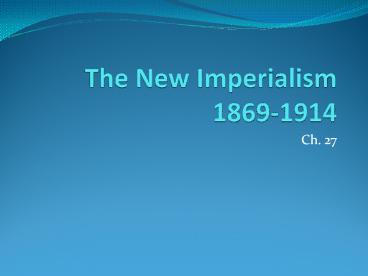The New Imperialism 1869-1914 - PowerPoint PPT Presentation
Title: The New Imperialism 1869-1914
1
The New Imperialism 1869-1914
- Ch. 27
2
New Imperialism
- Imperial powers used economic and technological
means to reorganize dependent regions, bring them
into world economy. - Africa- done by conquest and colonial
administration - Latin America- done by indirect means
3
Motives
- Political-
- desire to gain national prestige
- Acquisition of new colonial possessions/ colonial
agents often sent troops first and informed home
govts. later. - Cultural-
- Exporting Western Civilization through
Christian missionary activity. - Imperialism gained popularity, racism, young men-
opportunities for adventure and glory
4
Motives
- Economic-
- Industrialization of Europe and North America-
stimulated a demand for minerals, industrial
crops, and stimulants (sugar, coffee, tea, and
tobacco) - Entrepreneurs/investors looked to profit- mines,
plantations, railroads in Asia, Africa, and Latin
America - Minimized risk by seeking diplomatic and military
support from their govt.
5
Tools of Imperialists
- Industrial revolution made imperialism possible
- Steamships and the Suez Canal gave Europeans
greater mobility and better communication. - Quinine-prevent malaria
- Invention of breechloader, smokeless gunpowder,
machine gun widened firearms gap - VIDEO- MODERN MARVELS
6
Colonial Agents Administration
- Colonists applied modern scientific and
industrial methods to their colonies that started
to transform African and Asian societies. - Some colonies retained traditional govt. some
were administered directly. - Cooperation of indigenous elite
- Traditional rulers
- Youth trained for modern jobs
- Women arrive, more racial segregation.
7
Scramble for Africa!
8
Egypt
- Egyptian khedives- expensive modernization
projects - Financed with high-interest loans form European
creditors - 1882- British sent army into Egypt, established a
system of indirect rule to protect loan
investments - British worked to modernize Egypt
- Dam across the Nile- help agriculture/cotton
- Benefited only small elite
- Accompanied by Western ways conflicted with Islam
9
Western and Equatorial Africa
- West Africa- French built railroad from upper
Senegal River- upper Niger - Open interior to French merchants.
- France claimed northern bank
- Belgium- claimed area south of Congo River
10
Western and Equatorial Africa
- Berlin Conference on Africa- 1885 1886
- Lay out framework for how Africa would be divided
up - Occupation of Africa took many years, met with
much resistance - West Africa, new colonial power developed
existing trade networks. - Equatorial Africa
- Little inhabitants or trade
- Concessions to private companies that forced
Africans to produce cash crops and carry them to
nearest river or railroad.
11
Southern Africa
- Good pastures, farmlands, and mineral wealth
- Discovery of diamonds in 1868
- Led to the defeat of the Xhosa and the Zulu
- 1910- European settler created the Union of South
Africa - Afrikaaners emerged as ruling element in a govt
that assigned Africans to reservations,
established a system of racial segregation.
12
1914 African Imperialism
13
Political and Social Consequences
- Mixed feelings about European invasion by natives
- Some fought (Zulu, Ndebele)
- Ethiopia successfully defended itself against the
British-1896 - Most tried to live as before, difficult due to
colonial policies - Imposition of taxes on Africans forced them into
low-paying jobs. - Womens property rights undermined
- Given to the head of house (a.k.a. the man)
14
(No Transcript)
15
Cultural Responses
- Missionaries taught practical skills (crafts and
domestic skills) and western ideas - Mission educated Africans started to critique
colonialism - Colonialism contributed to diffusion of Islam by
- Building cities
- Increasing trade
- Allowing Muslims to settle in new areas































